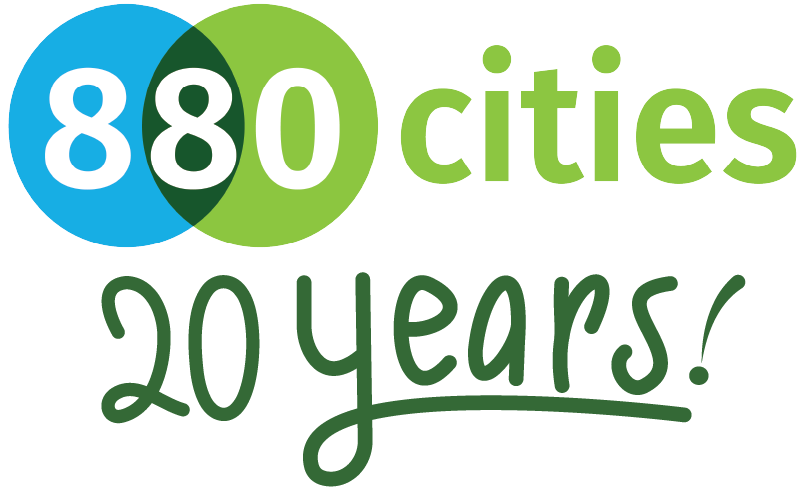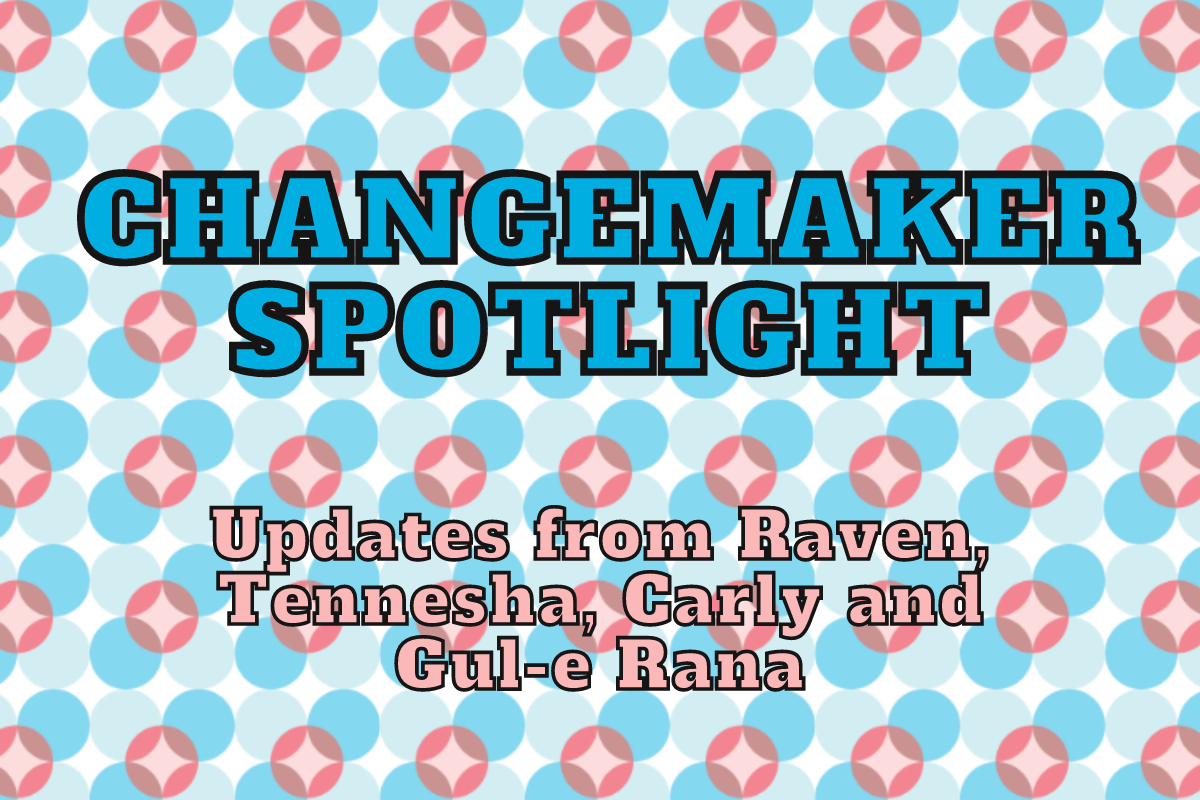
12 May Changemaker Spotlight: Updates from #OCChangemakers Raven Debassige, Tennesha Joseph, Carly Hayes and Gul-e Rana
Ontario Community Changemakers is a fellowship and micro-grant program for young civic innovators with bold ideas to activate public space, enhance civic engagement and foster social inclusion. This program is powered by 8 80 Cities and funded by Balsam Foundation. Visit ontariocommunitychangemakers.org to learn more.
Raven Debassige
Live Love Lounder: Isle of Innisfree
Sudbury, ON
#communityart #socialinclusion
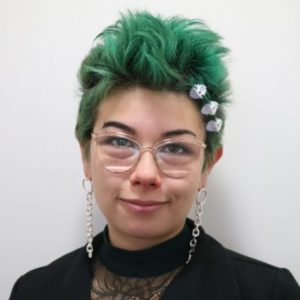 Raven Debassige is a local multidisciplinary artist, art instructor and project coordinator for community art initiatives. She finds her inspiration in her Aboriginal heritage and finds comfort in expressing her culture through art.
Raven Debassige is a local multidisciplinary artist, art instructor and project coordinator for community art initiatives. She finds her inspiration in her Aboriginal heritage and finds comfort in expressing her culture through art.
Over the past couple of years, Raven, alongside her team, has provided ten inclusive community art projects, murals, opportunities, and social activities facilitated within the Isles of Innisfree community through their non-profit organization Live Love Louder: Isles of Innisfree. This project aims to engage the youth and encourage participation in community activities and creative arts and instill a sense of community pride through revitalization and beautification. This goal became one of their highlights as they saw the impact beautification had on instilling community pride. Raven says, “We feel that we have impacted the youth of Innisfree, through engaging the youth and encouraging creative play.”
Over the past six months, Raven and her team organized two initiatives and will now be moving to digital workshops. One of the two initiatives was a community art pop-up event where Raven and her colleague, June Davis, held an outdoor rock painting workshop with the participation of over a dozen youth aged between six and twelve. The second initiative, which was also successful, was the “Biindigen Bus” which transformed local foster parent Jodi Armstrong’s family vehicle into an eye-grabbing celebration of cultural heritage. The “Biindigen Bus” has left a lasting impression and they hope it will bring awareness and visibility to the important work involved in fostering children and supporting families as they heal through the traumas caused by colonization.
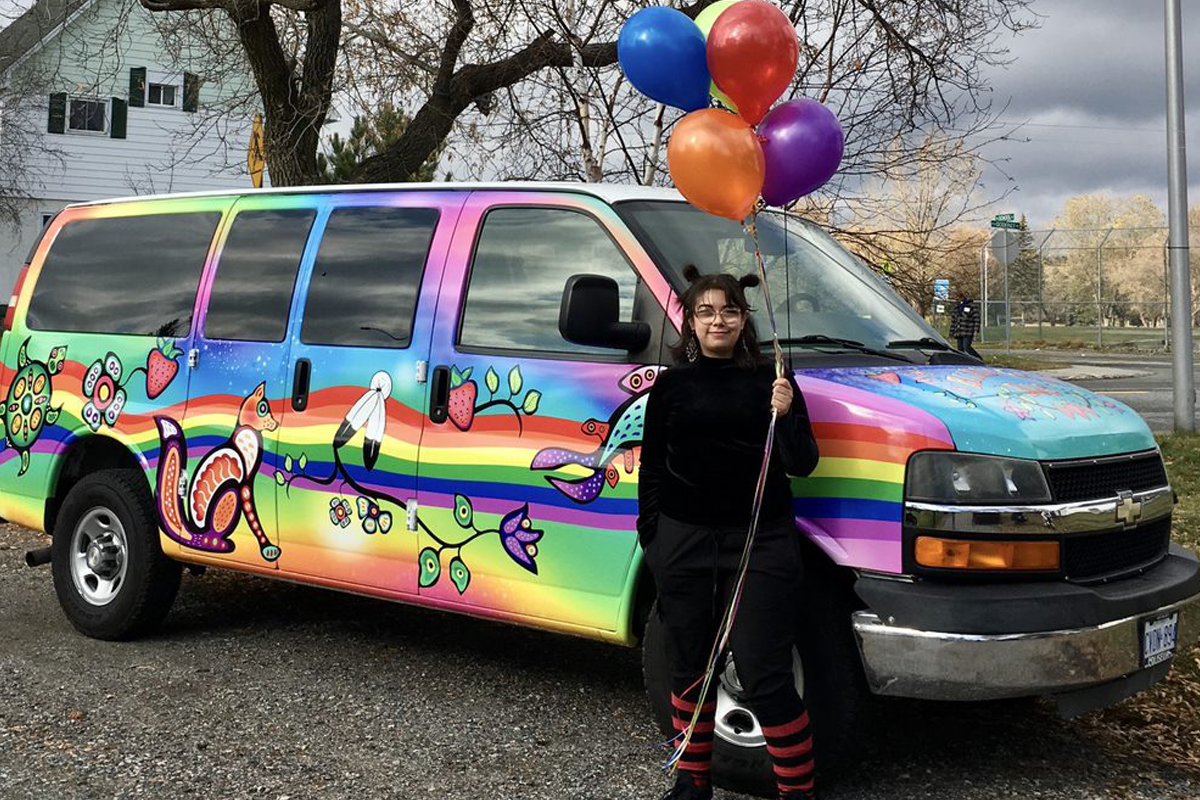
Throughout the project’s progression, Raven faced challenges of inaccessible workspaces and limitations due to the COVID-19 pandemic as well as the weather. At Isles of Innisfree, they were unable to access spaces where people could gather, given the health and safety guidelines. Nonetheless, Raven and her colleague overcame this challenge by hosting the rock painting workshop outdoors at the end of the Summer, which provided the youth with a chance to play and make art safely outdoors. With the weather getting colder and restrictions becoming stricter, they moved online and approached projects digitally. For the Biindigen Bus, the process consisted of designing the van digitally and then printing it as a car wrap.
As she continues to move forward, Raven plans a series of inclusive workshops that will take place virtually on Zoom. The workshops will involve a variety of creative art activities, encouraging an open safe space for community participation in the arts.
Follow her work on Facebook.
Tennesha Joseph
Are You Afraid Of The Dark T.O?
Toronto, ON
#publicspace #socialinclusion
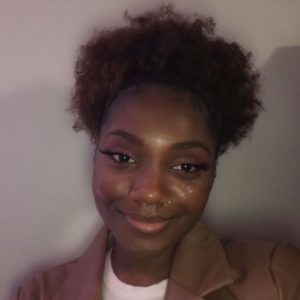 Tennesha Joseph is an aspiring community planner from Scarborough, Ontario. Through her studies, she developed a strong interest in bottom-up approaches to planning that meaningfully redistribute power to those who feel they have none. As a queer Black woman and future planner, she is committed to using these approaches to build safe and inclusive communities.
Tennesha Joseph is an aspiring community planner from Scarborough, Ontario. Through her studies, she developed a strong interest in bottom-up approaches to planning that meaningfully redistribute power to those who feel they have none. As a queer Black woman and future planner, she is committed to using these approaches to build safe and inclusive communities.
Tennesha’s project, Are You Afraid of the Dark T.O? was conceived last Summer as a means to reclaim space and empower others to do the same. Initially inspired by a glow-in-the-dark swing set installation in Boston by Howeler + Yoon Architecture called “Swing Time,” the concept was shaped by Tennesha’s own lived experiences and other young women in her community. The project’s mission is to create a welcoming and safe space that empowers young women to be outdoors after dark. The project will feature a temporary public outdoor installation for young women that will use unique seating arrangements and LED lighting to improve perceptions of safety after dark.
Over the last six months, Tennesha created a project outline with a clear vision and objectives and a preliminary rendering for the proposed installation using Photoshop and Sketch Up. She also launched the project’s official website, which features their new and improved logo that reflects their values and commitment to providing safe spaces for young women to connect at night. Tennesha drafted a short questionnaire to understand better how young women’s perception of safety in public spaces changes from day to night and kick off her engagement process.
The project has sparked great conversations amongst the women and girls in her community regarding safety at night. “The positive responses from my colleagues, peers, friends and family leave me with no doubt that this project will culminate into something young women in my community can derive value from,” says Tennesha. She was even contacted by a news reporter to possibly do a story on her upcoming project for the July/August issue of the publication.

The biggest challenge Tennesha has faced thus far was balancing work and the project. To overcome this, she started to build a team of volunteers to assist with various project elements. Another challenge for her was acquiring additional funding since she was not a registered charity or non-profit. So, she decided to scale down the project to have the OCC grant cover just the cost of the installation materials. And instead of hiring a contractor to build the installation, she opted for pre-made seating structures that offer more flexibility in arrangement and lighting colour.
In the next six months, Tennesha plans to finalize the location and dates for the installation, which requires producing a site plan along with a permit application. The project will also be moving full force into their engagement process with the local community, including contacting their local councillor, youth agencies and women’s groups. She also plans to host events and create flyers and other materials to engage the community about her project.
Visit the project’s website.
Instagram: @afraidofthedarkto
Carly Hayes
Youth Food Policy Council
Ottawa, ON
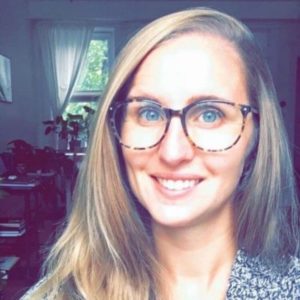
#youthengagement #foodpolicy
Carly Hayes is a Senior Policy Analyst with the Public Health Agency of Canada in the Office of International Affairs and the Research and Education Lead for the Food Secure Canada Youth Caucus. Carly seeks to establish an Ottawa Youth Food Policy Council (OYFPC) as she recognizes that different lived experiences, schedules, commitments, and comfort levels may deter youth from participating in traditional food policy councils, which is structured to include only members with significant experience in the local food movement.
The goal of her project is to engage youth to identify food policy issues that are important to them and to be a mechanism through which youth can contribute to a better food system for Ottawa, where all community members have meaningful access to safe, affordable, nutritious, sustainable, culturally-relevant foods, and the right to food is upheld by decision-makers and power-holders in Ottawa. “As the ones who will inherit the food system, youth need their own forum to learn about, discuss, and advocate for the food issues that matter most to them,” says Carly.
One of the major milestones of this project was establishing a connection with the Ottawa Food Policy Council (OFPC) by becoming a member of the Council as well as obtaining the Council’s buy-in and support for the creation of a Youth Food Policy Council. Carly also established a partnership with Just Food, a local organization that works on food and farming issues in Ottawa and the region. They are actively involved in the development of a Food Strategy for Ottawa. In collaboration with Just Food, they are planning an event for youth in relation to the launch of the Food Strategy for Ottawa, which will include a forum to discuss important food issues for youth in the city and solicit interest in getting involved in the inaugural OYFPC.
For Carly, it has been a challenge balancing the project with her work as her work at the Public Health Agency of Canada has been overtaken by the global pandemic response. However, Carly was able to lay the groundwork for significant work coming up in the next six months. Carly will be hiring a youth coordinator through Just Food to help mitigate some of these challenges and assist in planning their upcoming event. The OYFPC will be officially announced at this event, with a call for interested youth to get involved. By connecting with other youth, Carly will be able to operationalize the vision for the OYFPC through biweekly meetings to finalize the work plan and governance structure and elect council presidents who will carry the Council forward for its first year.
Gul-e Rana
Wellness Café
Toronto, ON
#socialinclusion #mentalhealth
 Wellness Café is a grassroots organization in the newcomer and refugee-dense communities of Thorncliffe and Flemingdon Park. Founded by South Asian immigrant families, initially as part of the Afghan Women’s Organization, the café’s main focus is to encourage conversations around mental health and trauma that immigrants and/or refugees in the community face. The idea to address mental well-being was influenced by the Syrian refugee crisis, wherein numerous refugees settling within the Thorncliffe and Flemingdon Park communities carried trauma from the horrors of the Middle Eastern war.
Wellness Café is a grassroots organization in the newcomer and refugee-dense communities of Thorncliffe and Flemingdon Park. Founded by South Asian immigrant families, initially as part of the Afghan Women’s Organization, the café’s main focus is to encourage conversations around mental health and trauma that immigrants and/or refugees in the community face. The idea to address mental well-being was influenced by the Syrian refugee crisis, wherein numerous refugees settling within the Thorncliffe and Flemingdon Park communities carried trauma from the horrors of the Middle Eastern war.
The Wellness Cafe believes that a part of mental health includes understanding one’s sense of place, identity and belonging. With the funding from Ontario Community Changemakers, Gul-e and her team plan to host a community healing and inter-learning event to highlight the importance of maintaining good mental health and wellbeing through art therapy and storytelling while also fostering inclusion and unity within their community. Despite the challenges in connecting with the community virtually, Gul-e and her team have had meetings to plan and brainstorm for their upcoming workshops and events. They engaged with over 80 residents to hear their ideas on what they would like to see at those events. “We learned that many residents have been impacted by recent incidences and hate-motivated crimes in the neighbourhood. Therefore, an art series that focuses on healing and community safety and well-being was brought up,” says Gul-e.
After learning about the needs of the community, Gul-e and her team plan to invite South Asian, Black, and Indigenous community artists and leaders to host a community healing and inter-learning event through art workshops where participants are encouraged to express themselves through painting, sketching and digital art while sharing stories about their identities here on Turtle Island. “The workshops will also be a space to exchange and create dialogue about understanding our role as migrant settlers on Indigenous lands in order to encourage reconciliation and allyship between the South Asian, Black and Indigenous communities,” says Gul-e.
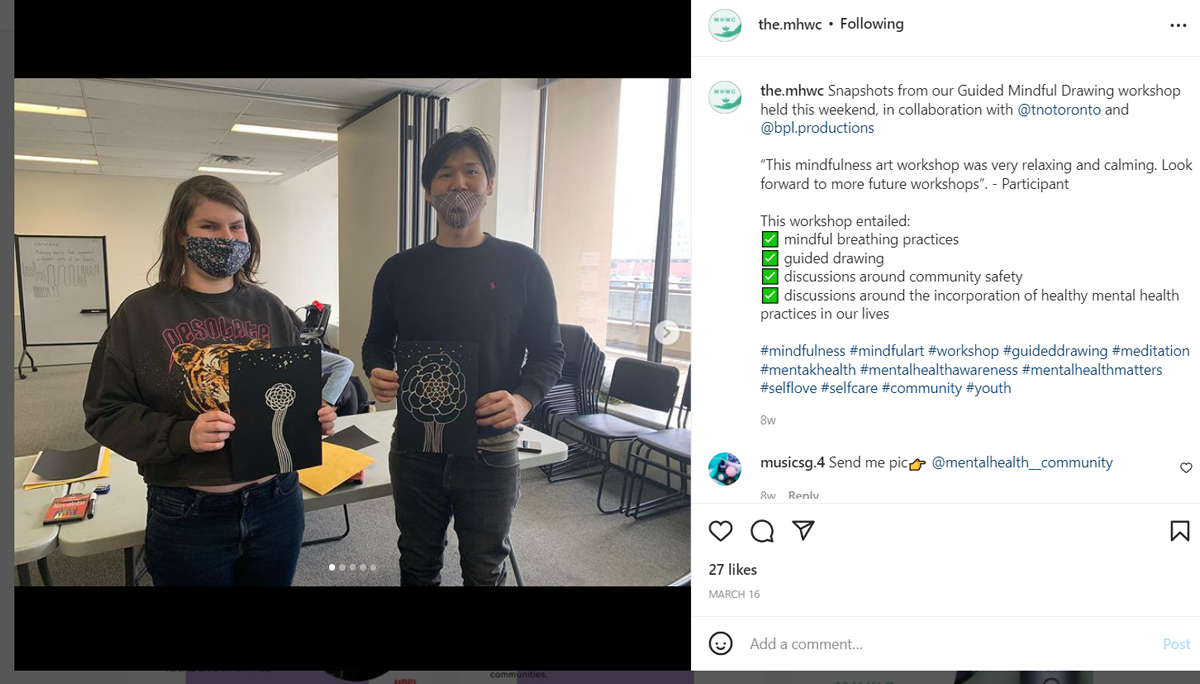
There were a few challenges due to a large amount of planning and coordination that is required for the art workshops. Nonetheless, Gul-e and her team were able to delegate tasks, finalize the art workshops with all the artists, purchase supplies, arrange for space, do outreach and host the workshops.
Follow Wellness Café on Facebook and Instagram.
